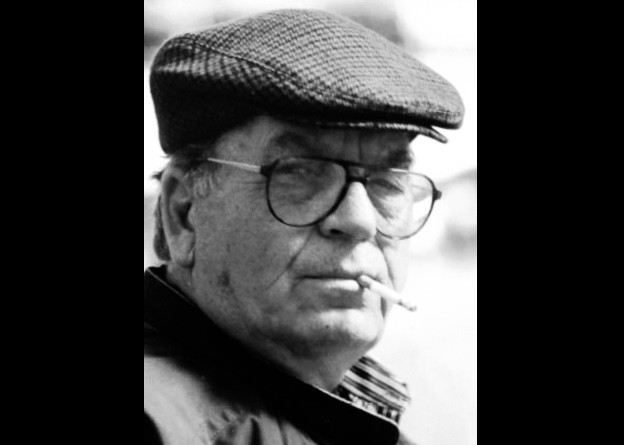Muhammad al-Maghut's poetics of nonchalance

The Syrian poet Muhammad al-Maghut (1934–2006) embraced the persona of the outsider, the loiterer, the hobo. He performed it in his life and in his poetry. This marginal posture guides and supplements the reading of his work and the perceived achievement of his poetic project.
The story goes that he joined the Baʿth party because its office happened to be closer to his house than that of the rival political party. Moreover, the Baʿth had the added advantage of a fireplace in the winter. And so, by accident, he ended up as a political prisoner in the Mezzeh prison outside of Damascus where he began writing on cigarette boxes. It didn’t occur to him that his writings were poetry until he showed them to his cellmate (none other than the poet Adunis) who said they might very well be. This is how al-Maghut himself likes to portray the beginning of his poetic career and his politcal invovlement, a funny coincidence.*
Unlike most prose poets who participated in a collective theorizing effort which gradually morphed into something like a prose poem institution (with the journal Shiʿr journal at its core), al-Maghut insisted on remaining an outsider. The distance he maintained, even from his own art, developed into a distinct poetic statement voiced through a simple yet unexpectedly resonant poetic language. He was committed to a less-deliberate poetry; a poetry of experience as he called it. He presented his own brand of commitment: a penetrating social and political criticism delivered through ambivalence and sarcasm.
When his first poetry collection Sorrow in the light of the Moon (Huzn fī daw’ al-qamar) was published in 1959, it was received as an anomaly. Unlike many of the other Shiʿr members, who held academic degrees and were fluent in at least one foreign language, al-Maghut only knew Arabic and was largely self-taught. Still, his first collection, which seemed to come out of nowhere, was a groundbreaking poetic statement.
It is time
to rip something apart
to sail stubbornly
under a sad, sad rain,
not like an adventurer
in currents of suitcases and flowers,
but like a lowly rat,
like a teary-eyed rat
waking up, terrified,
to rip something apart
to sail stubbornly
under a sad, sad rain,
not like an adventurer
in currents of suitcases and flowers,
but like a lowly rat,
like a teary-eyed rat
waking up, terrified,
every time a ship wailed
and its lamps glittered
like the eyes of wet hyenas.
(excerpt from “A House by the Sea” from his A Room with a Million Walls)
and its lamps glittered
like the eyes of wet hyenas.
(excerpt from “A House by the Sea” from his A Room with a Million Walls)
There is a stubborn matter-of-fact-ness about al-Maghut’s poetic project in which he persevered from the very first poem until the end of his life. Despite the simplicity, monotony, and even predictability of his poetic voice, his relentlessness sometimes leads to unexpected poetic clearings.
Broken
without kin, without a beloved,
I loiter like scattering fog,
like a city burning at night.
Nostalgia stings my lanky sides
like the beautiful wind, the blind dust.
For, the road is long
and the forest grows distant like a spear.
(excerpt from “The Wing of Misery” from Sorrow in the Light of the Moon)
without kin, without a beloved,
I loiter like scattering fog,
like a city burning at night.
Nostalgia stings my lanky sides
like the beautiful wind, the blind dust.
For, the road is long
and the forest grows distant like a spear.
(excerpt from “The Wing of Misery” from Sorrow in the Light of the Moon)
He is a poet not concerned with building a poem or finding a place for himself in a tradition. He is preoccupied with poetry in its most abstract sense. He approaches it as an adversary and sometimes succeeds in caputring it in the most unexpected ways.
I have had it with you, Poetry, you immortal corpse.
Lebanon is burning.
It jerks like a wounded mare at the mouth of the desert
while I look for a plump girl
to rub against on a bus,
for a man with Arab features
to kill somewhere.
My homeland falls apart
shivers naked like a cub lioness
while I search in an isolated corner
for a desperate peasant girl to lure.
(excerpt from “The Burning of Words” from Sorrow in the Light of the Moon)
Lebanon is burning.
It jerks like a wounded mare at the mouth of the desert
while I look for a plump girl
to rub against on a bus,
for a man with Arab features
to kill somewhere.
My homeland falls apart
shivers naked like a cub lioness
while I search in an isolated corner
for a desperate peasant girl to lure.
(excerpt from “The Burning of Words” from Sorrow in the Light of the Moon)
*A collection of interviews with al-Maghut is available in Khalil Swaylih’s Ightisab Kana wa akhawatiha (Damascus: Dar al-Balad, 2002).
Arabic Modernism's Other Tradition